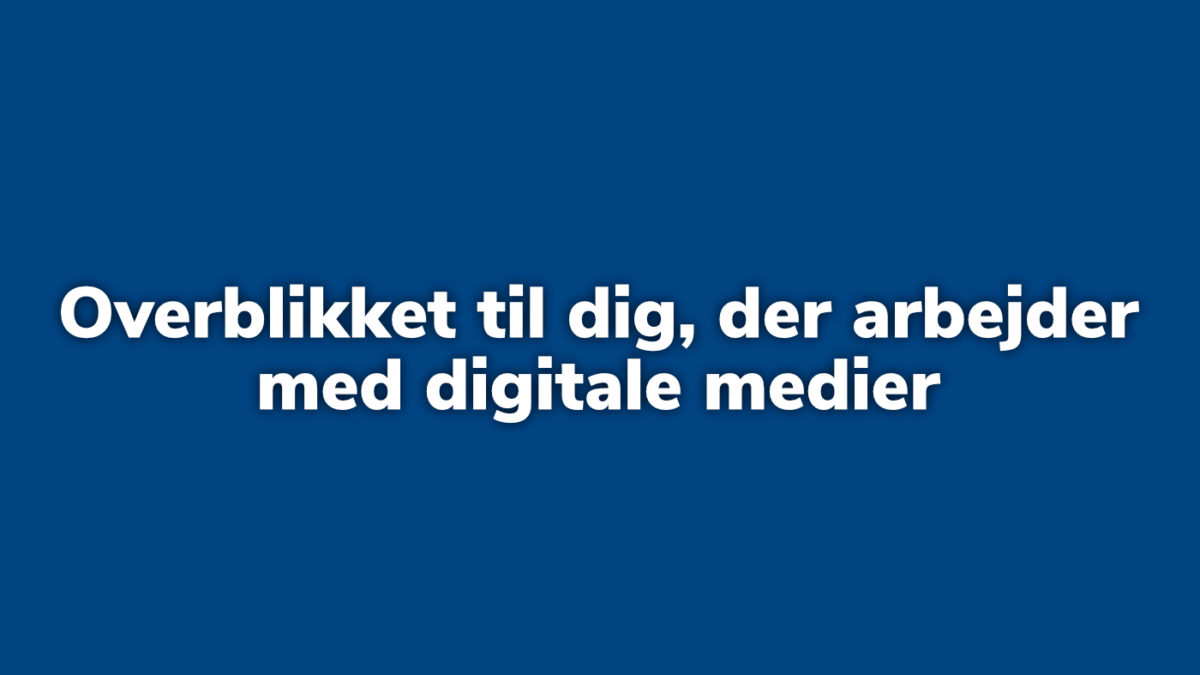Digitale tendenser, uge 39 (2020)

Her har du den mest komplette opdatering på sociale medier og digital udvikling i mediebranchen. Du bliver holdt opdateret og sparer masser af tid.
Digital Ugerevy udgives af Lars K Jensen, der rådgiver, udvikler og arbejder med digitale medier og udvikling.

[toc]
Del 1: Sociale medier

Her finder du historier om eller fra de store sociale platforme, der har en enorm rolle at spille i kontakten mellem udgiver/afsender og modtager.
🇪🇺 Facebook er – ikke – ved at forlade EU
MediaWatch / Ritzau:
"Vi har absolut ingen lyst til, intet ønske om, ingen planer om at trække os ud af Europa. Vi er glade for, at så mange mennesker finder vores tjenester nyttige. Og altafgørende er det, at vi er meget stolte over, at vi spiller en sådan nøglerolle, som hjælper små og mellemstore virksomheder gennem denne vanskelige tid," udtaler Nick Clegg, global direktør for public affairs i Facebook, i en mail til Ritzau Finans."
🔜 Tilsynsråd går snart i gang
BBC News:
"Users will be able to file appeals against posts the firm has removed from its platforms, and the board can overrule decisions made by Facebook's moderators and executives, including chief executive Mark Zuckerberg.
The timing means that some rulings could relate to the US Presidential election, which is on 3 November."
😬 Et kig – eller lyt – ind i Zuckerbergs liv som CEO
The Verge:
"Between May and August, The Verge obtained 16 audio recordings and dozens of internal posts and screenshots from meetings and groups at Facebook from employees. The recordings include the company’s weekly Q&As, “FYI Live” sessions in which top executives discussed a civil rights audit and preview the summer’s congressional antitrust hearing, and talks by top executives highlighting the work their teams are doing."
🙌 Nu forsvinder tekstbegrænsningen i Facebook-annoncer
Social Media Today:
"This is a significant update for Facebook Advertisers. According to reports, Facebook is removing its restrictions on ads which include more than 20% text in the main image."
📈 Facebook Video booster brugergenereret indhold
Digiday:
"Facebook now drives more demand for ViralHog clips than YouTube does, founder and CEO Ryan Bartholomew said. Jukin Media, which got its start mostly by licensing content to legacy broadcasters, quietly launched a self-serve platform late last year that allows anybody to license clips for as little as $49, and through the first half of this year nearly half that platform’s 1,200 customers are individual creators, a company spokesperson said."
✋ Facebook blokerer kinesisk propaganda med AI-ansigter
Profilerne skulle angiveligt bruges – i mindre skala – i forbindelse med det kommende præsidentvalg i USA.
TechCrunch:
"In its latest report on this kind of coordinated campaign, the company says it took down 155 Facebook accounts, 11 pages, nine groups and seven Instagram accounts connected to the Chinese activity and 57 accounts, 31 Pages and 20 Instagram accounts for the activity in the Philippines. Both operations broke Facebook’s rules against “coordinated inauthentic behavior on behalf of a foreign or government entity.”"
🤝 Anti-had: De store platforme enige om standarder
MediaWatch:
"Sammen med marketingbureauer og ‑agenturer har en række techselskaber indgået en aftale om et sæt fælles industristandarder for, hvornår indhold kategoriseres som hadefuldt eller skadeligt for brugere på deres platforme."
😔 Twitter må undskylde for racisme i ansigtsalgoritme
The Guardian:
"Twitter has apologised for a “racist” image cropping algorithm, after users discovered the feature was automatically focusing on white faces over black ones.
The company says it had tested the service for bias before it started using it, but now accepts that it didn’t go far enough."
🗳 Twitter vil have amerikanerne til stemmeurnerne
USA Today:
"Every person on Twitter in the United States on Tuesday, which is National Voter Registration Day, will get a prompt in their timeline to register to vote or confirm their registration via TurboVote, an online tool from the nonpartisan nonprofit Democracy Works."
🤯 TikTok
😳 TikTok-handel skaber forvirring
Denne overskrift hos TechCrunch siger det nok egentlig meget godt:
"ByteDance says it will own a majority of TikTok. Oracle says ByteDance will own 0%. WTF is this deal?"
Eller som The Verges Casey Newton skriver:
"TikTok's weekend of "Ekejechbecehggedkrrnikldebgtkjkddhfdenbhbkuk"
↓
"TikTok, a political football, is still up in the air"
Columbia Journalism Review
↓
Trump havde truet med at blokere såvel TikTok som WeChat. WeChat-blokeringen er nu udsat.
😱 Trumps TikTok-håndtering vil få længerevarende konsekvenser
Wired:
"As relations with China worsened amid the coronavirus pandemic, Trump and other White House officials began taking greater interest in the app. It was an opportunity for the administration to set an agenda for what information tech firms—including domestic ones—should be allowed to collect about Americans and under what circumstances. Instead, the White House treated TikTok like a geopolitical hot potato and failed to address any longer-term issues with privacy or data security."
💬 Sociale medier generelt
👎 Kritik af 'The Social Dilemma'-filmen
Inside Media:
"Argument #1: That's not how dopamine works.
"The Social Dilemma" argues that Facebook and Twitter engineers designed their products to act as a sort of hack on our brains. We get a little "dopamine hit" every time we see a like or retweet on one of our posts. It's easy to get addicted to that feeling and keep posting, keep scrolling, trying to get ourselves the next hit.
Of course, some research has indicated that this isn't how it works at all. One study suggests that there's no evidence that reward stimuli plays a role in reinforcing behavior. (This argument is expanded on in a particularly scathing indictment of the film on Jacobin.)"
👩💻 Maskinerne overreagerede: YouTube sætter mennesker i gang
The Verge:
"Around 11 million videos were removed from YouTube between April and June, says the FT, or about double the usual rate. Around 320,000 of these takedowns were appealed, and half of the appealed videos were reinstated. Again, the FTsays that’s roughly double the usual figure: a sign that the AI systems were over-zealous in their attempts to spot harmful content."
👴 Her er Bidens influencer-strategi
Recode:
"Biden, whose team has even hired a firm to assist with influencer outreach, has developed a formula for working with these influencers: He sits at home, often in front of a plant-filled backdrop and a window, while the influencer asks him open-ended questions that allow Biden to talk off the cuff about any given topic. These interviews are often streamed on Instagram Live, but they also pop up on Facebook and YouTube. "
🤷🏼♂️ Reddit kom af med QAnon – ved et tilfælde
The Atlantic:
"Unfortunately, Reddit is not particularly good at explaining how it accomplished such a remarkable feat. Chris Slowe, Reddit’s chief technology officer and one of its earliest employees, told me, point-blank: 'I don’t think we’ve had any focused effort to keep QAnon off the platform.'"
🆕 Telepath vil blande Twitter og Reddit
The Interface:
"The duo, who previously worked together at the question-and-answer community Quora, today announced a wider release for Telepath, a new app for discussing your interests. The app, which like Clubhouse is available only in private beta and requires an invitation to use, resembles a hybrid of Twitter and Reddit. As on Twitter, the app opens to a central scrolling feed of updates from people and topics that you follow. And as on Reddit, every post must be created within a group, which Telepath calls a 'network.'"
↓
Telepath er pt. i beta, og det ser ikke ud til, man kan skrive sig på ventelisten med andet end US-telefonnumre 😕
Del 2: Digitale medietendenser

Her kan du læse nogle af ugens tendenser indenfor medier. Det kan være en ny metode eller tilgang, branchen forsøger at tage til sig.
📨 Flere og flere journalister starter egne nyhedsbreve (betalte)
Det her er en megainteressant tendens. "Journalists Are Leaving the Noisy Internet for Your Email Inbox," skriver The New York Times.
Det handler om, at flere og flere journalister og redaktører siger deres job op for i stedet selv at køre et nyhedsbrev – og tage penge for det.
Det primære eksempel i NYTimes-artiklen er Casey Newton (der har sagt op fra The Verge), der har fået mange følgere på sit 'The Interface'-nyhedsbrev, som han har kørt hos The Verge. Nu skal han skrive om platforme.
Han er ikke nævnt i artiklen, men det er værd at nævne, at også Digidays chefredaktør, Brian Morrissey, har sagt sit job op – for at køre det nyhedsbrev. Han skal skrive om, hvordan man skaber bæredygtige medieforretninger.
📊 Spænder medierne ben for sig selv med visualiseringer?
DMJX:
"Nyt forskningsprojekt på DMJX vil undersøge, om danske nyhedsmediers brug af infografik og datavisualisering til formidling af samfundsrelevante forhold giver effektiv oplysning eller bare overfladisk underholdning."
🛑 CNN lukker streaming-site målrettet unge og millennials
The New York Post:
"The short-form video network was billed as a way for CNN to reach a younger generation and compete with digital rivals like Vice and BuzzFeed, which at the time were grabbing a growing audience of millennials interested in mainstream news. [...]
CNN was hoping the digital unit would not only attract younger consumers between 25 and 35 years of age, but also new advertisers and branded content partnerships. But Great Big Story’s momentum had been slowing for some time."
🤕 Apple klar med ny anti-tracking-hovedpine til medierne
Digiday:
"In the new update, which went live on September 16, Apple’s Intelligent Tracking Prevention feature — which blocks cross-site tracking on Safari — is switched on by default for all browsers. Further down the pike, Apple will also roll out a change that reflects a relatively new ITP workaround."
🍾 YouSee lancerer streaming-tjenesten Youtv
MediaWatch:
"Yousee forsøger at sætte prop i kundesivningen i sin tv-forretning og har i den forbindelse nu lanceret en internetbaseret tv-løsning Youtv, der skal appellere til en anden målgruppe end Yousees traditionelle tv-pakker og ‑produkter. Det fortæller Michael Moyell Juul, adm. direktør for Nuuday, der huser bl.a. TDC's tv-aktiviteter, til Berlingske."
↓
"Priserne for den nye tjeneste begynder ved 199 kroner om måneden," skriver Computerworld.
↓
Læs også:
"How TV networks are setting up for the expanding ad-supported streaming war"
Digiday
📺 Discovery pusler med streaming-tjeneste
Digiday:
"Discovery plans to debut its direct-to-consumer streaming service — which will be called Discovery+ — in the first quarter of 2021, according to agency executives. Some agency executives had been told that the TV network group was aiming to launch the standalone streamer in the fourth quarter of 2020, but were skeptical of the timeframe given a lack of details about the service’s pricing, sponsorship packages and distribution plans. A Discovery spokesperson declined to comment."
🐵 MailChimp lancerer AI-værktøjer
Marketing Land:
"New tools include Creative Assistant to automate content creation; dynamic recommendations—including personalized product recommendations—based on customer performance data, as well as global industry trends; and a new customer journey builder."
Del 3: Business

Her kan du læse nogle af ugens historier og tendenser indenfor forretningsudvikling i mediebranchen. Altså det, der handler om at tjene penge.
😯 Lydartikler gav Zetland 2.000 medlemmer under nedlukningen
Journalism.co.uk:
"Danish publisher Zetland, however, took a very different approach. Its slow journalism style means it publishes two or three pieces a day, each with its own audio version read by the reporter, plus a daily news podcast. For a team of 20 editorial staff, that may not seem like much output.
But it is precisely this emphasis on audio that has helped the slow journalism publisher reach 17,000 paying members to date. It is now stable and breaking even, according to Tav Klitgaard, CEO, Zetland, speaking at FIPP World Media Congress 2020."
📧 Tips fra The Economist til din nyhedsbrevsstrategi
"Here is how to craft emails that will keep audiences informed but not overwhelmed," skriver Journalism.co.uk.
De fem anbefalinger er:
- Make newsletters into a stand-alone product
- Hone in on a powerful user journey
- Devise cross-functional email teams
- Never stop improving the tools and product
- Understand your reader's pain points
↓
Læs også:
"Nyhedsbrevets rejse: Fra markedsføring til produkt"
Lars K Jensen
↓
Mere om The Economist:
Election-focused products charge U.S. growth at The Economist
Digiday
🎤 Derfor udviklede Schibsted sin egen podcast-platform
"The effort has taken roughly 30 people across different parts of the business, including product teams, developers and content teams across its news titles."
Digiday:
"Using premium audio to drive subscriptions is a pretty underused tactic partly because it requires wonky tech workarounds, as Digiday has previously reported, especially as Apple, Google — and more recently Spotify — are globally the dominant podcast platforms. To take podcasts seriously, it’s becoming vital that publishers break away from platforms and build their own podcast models."
↓
Mere Schibsted:
Schibsted runder en milliard på digitale brugerindtægter
MediaWatch
💯 100 millioner vil betale for online-nyheder i 2030 (på engelsk)
PressGazette:
"The chief executive of the New York Times has predicted that 100m people will have digital English-language news subscriptions in ten years’ time."
🙄 Quibi leder muligvis allerede efter en køber
Recode:
"Quibi was supposed to be revolutionary: A video service that was supposed to fill the gap between YouTube and HBO by bringing short, “premium” clips starring celebrities like Liam Hemsworth and Chrissy Teigen to your phone, for a price.
But that was in the spring. Now, Quibi might be headed to a fire sale: Just six months after launching — and after raising $1.8 billion — Quibi has started looking for a buyer. It’s a stunning admission that the high-profile service hasn’t found enough traction to continue on its own."
💰 Den Danske Ordbog vil på finansloven
MediaWatch:
"Det Danske Sprog- og Litteraturselskab, der står bag det store opslagsværk Den Danske Ordbog, ser ind i et 2021 med halveret støtte fra staten. Skal ordbogen i fremtiden opdateres, bør den få en fast bevilling på finansloven, lyder det fra udgiveren."
Del 4: Udvikling og tech

Her får du et kig på nogle af ugens historier indenfor den digitale udvikling og teknologi, der enten direkte eller indirekte kan have betydning for medier/udgivere.
🕵️♂️ De vigtigste privacy-funktioner i iOS14
Wired:
"iOS 14 has begun rolling out to iPhones worldwide, and as is typical for Apple and a new iOS release, security and privacy enhancements are front and center. The new mobile operating system should make you and your data safer than ever. But it's important to know where these various features are and how to use them."
🦠 Google bygger COVID-19-lag til Maps
TechCrunch:
"Google today announced an update to Google Maps that will bring a new COVID-19 layer to the service to help you better understand the number of cases in a given area. With the pandemic continuing to spread in many countries — and ahead of what many fear will be a second wave — Google Maps users can now enable this feature and see a color-coded map based on the number of cases per 100,000 people, as well as labels that indicate whether numbers are trending up or down."
🤓 Facebook vil lancere AR-briller i 2021
VentureBeat:
"During Facebook Connect — the replacement for the AR/VR event previously known as Oculus Connect — Facebook CEO Mark Zuckerberg said today that the company is planning to release its first pair of augmented reality glasses in 2021. While the company’s Oculus unit has become a leading provider of VR headsets, Facebook has touted AR as the next major frontier for computing, and this release date could spread the next-generation technology to the masses earlier than expected."
🐧 Nu kommer Microsofts browser på Linux
VentureBeat:
"Edge is finally coming to Linux. At Ignite 2020 today, Microsoft announced that Edge for Linux will be available in the Dev preview channel starting in October. Linux users will be able to download the preview from the Microsoft Edge Insider website or from their native Linux package manager. Microsoft will start with the Ubuntu and Debian distributions, with support for Fedora and openSUSE coming afterwards."
🤖 Microsoft får "eksklusiv" licens til GPT‑3
VentureBeat:
"The implications of the licensing agreement weren’t immediately clear, but Microsoft says that OpenAI will continue to offer GPT‑3 and other models via its Azure-hosted API, launched in June. (To date, the API, which remains in beta, has received tens of thousands of applications, according to OpenAI.) Microsoft plans to leverage the capabilities of GPT‑3 in its own products, services, and experiences and to continue to work with OpenAI to commercialize the firm’s AI research."
🎮 Amazon vil streame spil via 'Luna'
TechCrunch:
"The company is launching the product in early access at an introductory price of $5.99 per month. Users will be able to stream titles wirelessly without downloading the games and can play across PC, Mac and iOS (via the web). Users in the United States can request early access starting today."
